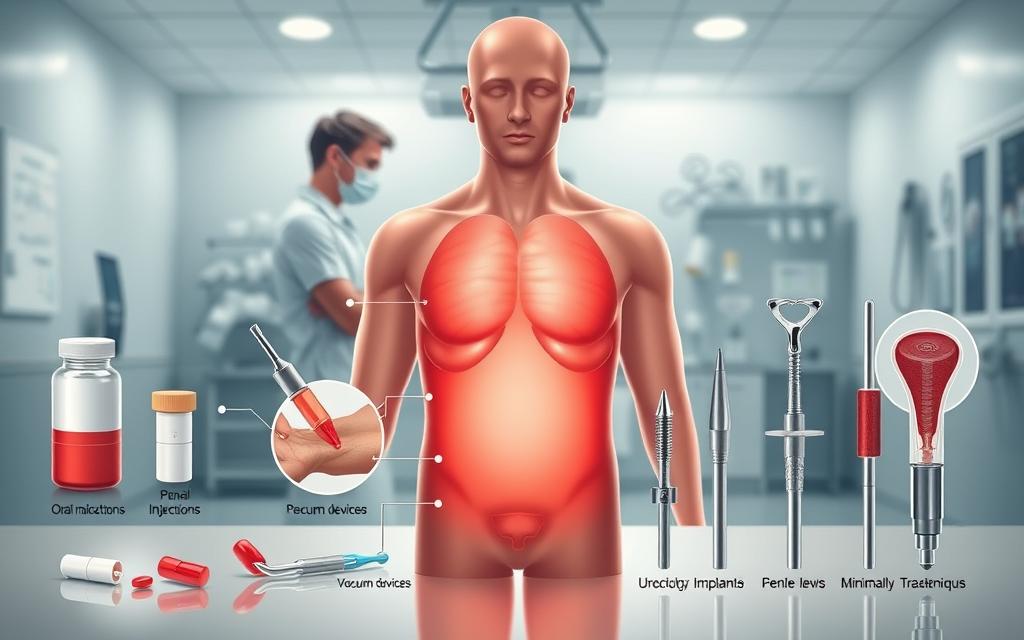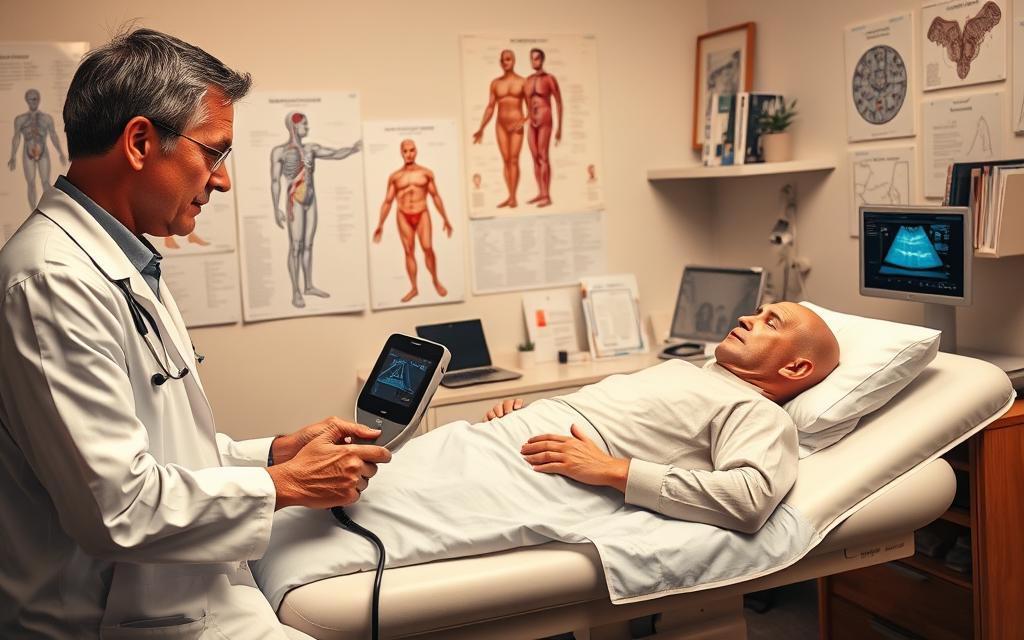Can a Urologist Treat Erectile Dysfunction?
Erectile Dysfunction (ED) is a common condition affecting millions of men worldwide. It is characterized by the inability to achieve or maintain an erection sufficient for satisfactory sexual performance. Seeking medical help is a crucial step towards addressing ED, and consulting a specialist is often the first step.
A urologist is a medical doctor who specializes in the diagnosis, treatment, and surgery of disorders related to the urinary tract and the male reproductive system. As such, they play a significant role in managing ED. They can help identify underlying causes, which may range from vascular and neurological issues to hormonal imbalances.
Understanding the causes, symptoms, and treatment options for ED is essential for effective management. This article will provide an overview of ED, its diagnosis, and the various treatment options available, highlighting the role of a urologist in this process.
Understanding Erectile Dysfunction: Causes and Symptoms
Understanding the complexities of erectile dysfunction is crucial for those affected by this condition. Erectile dysfunction (ED) is a multifaceted issue that can arise from a variety of physical, psychological, and lifestyle factors.
Common Causes of Erectile Dysfunction
Erectile dysfunction can be caused by a range of factors, including underlying health conditions such as diabetes, hypertension, and cardiovascular disease. Lifestyle factors, including smoking, excessive alcohol consumption, and a lack of physical activity, can also contribute to ED.
Moreover, psychological factors such as stress, anxiety, and depression play a significant role in the development of erectile dysfunction. For more information on the potential for curing ED, you can visit Colorado Urologists.
- Diabetes
- Hypertension
- Cardiovascular disease
- Psychological factors (stress, anxiety, depression)
- Lifestyle factors (smoking, excessive alcohol, lack of physical activity)
Recognizing the Symptoms of ED
The primary symptom of erectile dysfunction is the inability to achieve or maintain an erection sufficient for satisfactory sexual performance. This condition can manifest as a gradual or sudden change in erectile function.
Other symptoms may include a decrease in libido or difficulties in ejaculation. Recognizing these symptoms is crucial for seeking appropriate medical attention and diagnosis.
Can a Urologist Treat Erectile Dysfunction? The Specialist’s Role
A urologist is a medical specialist who can provide comprehensive care for erectile dysfunction. Urologists are trained to diagnose and treat conditions related to the urinary tract and male reproductive system, making them the appropriate specialists for addressing ED.

What is a Urologist?
A urologist is a doctor who specializes in the diagnosis, treatment, and surgery of disorders related to the urinary system in both men and women, and the male reproductive system. Their expertise includes managing conditions like erectile dysfunction, which affects a significant portion of the male population.
Why Urologists Are Qualified to Treat ED
Urologists are qualified to treat ED due to their in-depth knowledge of the male reproductive system and urinary tract. They can identify underlying causes of ED, such as vascular disease, hormonal imbalances, or neurological issues, and provide appropriate treatment options. For instance, a visit to a urologist specialist can help determine the best course of action for ED.
When to See a Urologist for ED
Men experiencing persistent or recurrent erectile dysfunction should consider consulting a urologist. Early intervention can help identify underlying health issues and improve treatment outcomes. A urologist can offer various treatment options tailored to the individual’s condition, enhancing the chances of successful management of ED.
Understanding the urologist’s role in ED treatment can empower men to seek the right medical help. By consulting a urologist, individuals can benefit from personalized care and a comprehensive approach to addressing erectile dysfunction.
Diagnosis Process: What to Expect at Your Appointment
When visiting a urologist for erectile dysfunction, patients can expect a thorough diagnostic evaluation. This process is crucial for understanding the underlying causes of ED and determining the most effective treatment plan.
Initial Consultation and Medical History
The diagnosis of erectile dysfunction begins with an initial consultation, where the urologist will discuss the patient’s medical history. This includes questions about overall health, sexual history, and any medications being taken. The urologist may also inquire about lifestyle factors such as smoking, alcohol consumption, and physical activity level, as these can contribute to ED.
Key aspects of the medical history include:
- Previous medical conditions, such as diabetes or heart disease
- Current medications and supplements
- Lifestyle habits, including diet and exercise
- Any previous treatments for ED
Physical Examination
A physical examination is a crucial part of the diagnostic process. The urologist will check for any physical signs that could be contributing to ED, such as issues related to blood flow or nerve function. This examination may include checking blood pressure, examining the genitals, and assessing overall health.
Diagnostic Tests for ED
Depending on the findings from the initial consultation and physical examination, the urologist may recommend diagnostic tests to further investigate the cause of ED. These tests can help identify underlying conditions that may be contributing to the symptoms. For more information on the diagnostic tests and treatment options, you can visit Mayo Clinic’s resource on ED diagnosis and.
Some common diagnostic tests for ED include:
- Blood tests to check hormone levels, such as testosterone
- Ultrasound to assess blood flow to the penis
- Penile plethysmography to measure erectile function
By understanding the cause of erectile dysfunction through this comprehensive diagnostic process, urologists can develop a personalized treatment plan to help manage the condition effectively.
Treatment Options Offered by Urologists for ED
Urologists offer a range of treatment options for erectile dysfunction, catering to different patient needs. The choice of treatment depends on the underlying cause of ED, the patient’s overall health, and the patient’s preferences.
Oral Medications (PDE5 Inhibitors)
Oral medications, specifically PDE5 inhibitors, are commonly prescribed as a first-line treatment for ED. These medications work by enhancing the effects of nitric oxide, a natural chemical the body produces that relaxes the muscles in the penis, increasing blood flow. PDE5 inhibitors like sildenafil (Viagra) and tadalafil (Cialis) are well-known examples.
The benefits of oral medications include their ease of use and relatively quick action. However, they may not be suitable for everyone, particularly those with certain health conditions or taking specific medications.
Common PDE5 Inhibitors:
- Sildenafil (Viagra)
- Tadalafil (Cialis)
- Vardenafil (Levitra)
- Avanafil (Stendra)
Injectable and Suppository Treatments
For some men, injectable or suppository treatments may be recommended. These involve injecting a medication directly into the penis or inserting a suppository into the urethra. Alprostadil is a common medication used in these treatments.
Injectable treatments can be effective, but they require proper technique to avoid complications. Potential side effects include pain and priapism.
Vacuum Erection Devices
Vacuum erection devices (VEDs) are another option for treating ED. These devices work by creating a vacuum around the penis, drawing blood into it, and then using a constriction ring to maintain the erection.
VEDs are non-invasive and can be effective, but they may require some practice to use correctly. Side effects can include bruising and numbness.

Penile Implants and Surgical Options
For men with severe ED who have not responded to other treatments, penile implants or surgical options may be considered. Penile implants involve surgically placing a device inside the penis to enable erections.
Surgical options, including penile implants, are typically considered last resorts due to their invasive nature and potential risks. However, they can offer a reliable solution for some men.
It’s essential to consult with a urologist, such as those at Colorado Urologists, to determine the most appropriate treatment plan.
Living with ED: Lifestyle Changes and Support
Living with erectile dysfunction can be challenging, but there are several lifestyle adjustments and support mechanisms that can help alleviate its symptoms. Erectile dysfunction (ED) is not just a physical condition but also has emotional and psychological implications. Therefore, managing it effectively requires a holistic approach.
Modifying Lifestyle to Improve Erectile Function
Certain lifestyle changes can significantly improve erectile function. Adopting a healthier diet rich in fruits, vegetables, and whole grains can enhance overall cardiovascular health, which is closely linked to erectile function. Regular physical activity, such as walking or jogging, can also improve blood flow and overall health.
Additionally, reducing or eliminating harmful habits like smoking and excessive alcohol consumption can have a positive impact on erectile function. Smoking damages blood vessels and reduces blood flow, while excessive alcohol consumption can lead to nerve damage and decreased sexual performance.
Strategies for Preventing ED
Preventing erectile dysfunction involves maintaining a healthy lifestyle and managing underlying health conditions. Regular check-ups with a healthcare provider can help identify and manage conditions like diabetes, hypertension, and high cholesterol, which are risk factors for ED.
For more information on managing health conditions that can lead to ED, visit St. Vincent’s HealthCare for resources and support.
Supporting Mental Health and Relationships
Erectile dysfunction can have a significant impact on mental health and relationships. Seeking support from a mental health professional can help individuals cope with the emotional aspects of ED. Couples therapy can also be beneficial in addressing relationship issues that may arise due to ED.
Open communication with a partner about ED can help reduce stress and anxiety related to the condition. It’s also important to explore various treatment options with a healthcare provider to find what works best for each individual.
Conclusion
Erectile dysfunction is a common condition that affects millions of men worldwide. Understanding its causes, symptoms, and treatment options is crucial for effective management. A urologist is a medical specialist who can diagnose and treat erectile dysfunction.
Seeking medical attention from a urologist specialist is essential for men experiencing ED symptoms. Urologists offer various treatment options, including oral medications, injectable treatments, and surgical interventions. By addressing underlying health issues and making lifestyle changes, men can improve their erectile function and overall well-being.
Can a urologist treat erectile dysfunction effectively? The answer is yes. A urologist specialist has the training and expertise to provide personalized care and treatment plans tailored to individual needs. By consulting a urologist, men can regain control over their erectile health and improve their quality of life.
